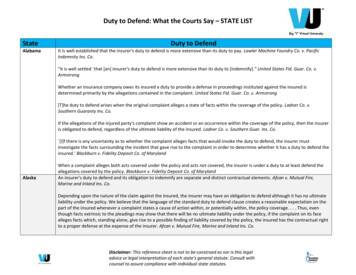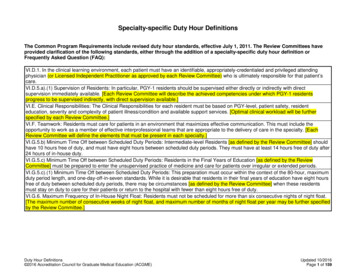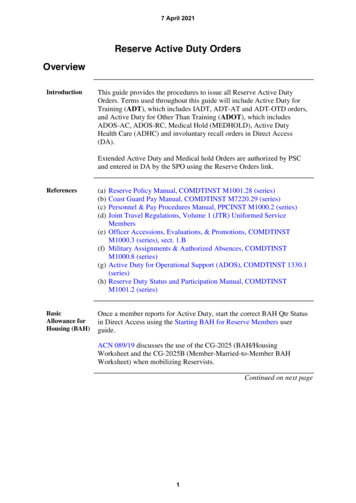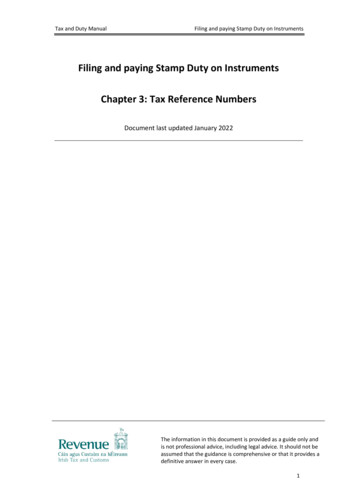
Transcription
Duty to Defend: What the Courts Say – STATE LISTStateAlabamaDuty to DefendIt is well established that the insurer's duty to defend is more extensive than its duty to pay. Lawler Machine Foundry Co. v. PacificIndemnity Ins. Co."It is well settled that [an] insurer's duty to defend is more extensive than its duty to [indemnify].” United States Fid. Guar. Co. v.ArmstrongWhether an insurance company owes its insured a duty to provide a defense in proceedings instituted against the insured isdetermined primarily by the allegations contained in the complaint. United States Fid. Guar. Co. v. Armstrong[T]he duty to defend arises when the original complaint alleges a state of facts within the coverage of the policy. Ladner Co. v.Southern Guaranty Ins. Co.If the allegations of the injured party's complaint show an accident or an occurrence within the coverage of the policy, then the insureris obligated to defend, regardless of the ultimate liability of the insured. Ladner Co. v. Southern Guar. Ins. Co. [I]f there is any uncertainty as to whether the complaint alleges facts that would invoke the duty to defend, the insurer mustinvestigate the facts surrounding the incident that gave rise to the complaint in order to determine whether it has a duty to defend theinsured.' Blackburn v. Fidelity Deposit Co. of MarylandAlaskaWhen a complaint alleges both acts covered under the policy and acts not covered, the insurer is under a duty to at least defend theallegations covered by the policy. Blackburn v. Fidelity Deposit Co. of MarylandAn insurer's duty to defend and its obligation to indemnify are separate and distinct contractual elements. Afcan v. Mutual Fire,Marine and Inland Ins. Co.Depending upon the nature of the claim against the insured, the insurer may have an obligation to defend although it has no ultimateliability under the policy. We believe that the language of the standard duty to defend clause creates a reasonable expectation on thepart of the insured whenever a complaint states a cause of action within, or potentially within, the policy coverage. . . . Thus, eventhough facts extrinsic to the pleadings may show that there will be no ultimate liability under the policy, if the complaint on its facealleges facts which, standing alone, give rise to a possible finding of liability covered by the policy, the insured has the contractual rightto a proper defense at the expense of the insurer. Afcan v. Mutual Fire, Marine and Inland Ins. Co.
Duty to Defend: What the Courts Say – STATE LISTStateArizonaDuty to DefendThe presence of other allegations in the complaint which are not within policy coverage does not relieve [the insurance carrier] of itsduty to defend. See Ferguson v. Birmingham Fire Ins. Co"The duty to defend . . . is not the same as the duty to indemnify. The duty to defend arises at the earliest stages of litigation andgenerally exists regardless of whether the insured is ultimately found liable." INA Ins. Co. of N. Am. v. Valley Forge Ins. Co.("[T]he insurer would have the duty to defend a suit alleging facts that, if true, would give rise to coverage, even though there wouldultimately be no obligation to indemnify if the facts giving rise to coverage were not established. Thus, pursuant to such policylanguage, the obligation to defend a suit may be broader than the obligation to indemnify.").In Arizona, "if any claim alleged in the complaint is within the policy's coverage, the insurer has a duty to defend the entire suit,because it is impossible to determine the basis upon which the plaintiff will recover (if any) until the action is completed." W. Cas. Sur.,130 Ariz, at 79, 634 P.2d at 6; see also Scottsdale Ins. Co. v. Van NguyenArkansasThe scope of the duty to defend under an insurance policy can be broader than the scope of the duty to indemnify. The "insurancepolicy language controls the scope and extent of an insurer's duty to defend." Cal Cas. Ins. Co. v. State Farm Mut. Auto. Ins. Co.It is well settled in Arkansas that the duty to defend is broader than the duty to pay damages. Home Indem. Co. v. City of MariannaIn examining the duty to defend, this court has recognized the general rule that the allegations in the pleadings against the insureddetermine the insurer's duty to defend. See Mattson v. St. Paul Title Co. of the South[T]he duty to defend is broader than the duty to indemnify. See Commercial Union Ins. Co. of America v. Henshall, supra.[T]he duty to defend arises when there is a possibility that the injury or damage may fall within the policy coverage. See HomeIndemnity Co. v. City of MariannaWhere there is no possibility that the damage alleged in the complaint may fall within the policy coverage, there would be no duty todefend. See C.T. Drechsler, Annotation, Allegations in Third Person's Action Against Insured as Determining Liability Insurer's Duty toDefendThere are occasions where an insurance company's duty to defend cannot be determined solely from the allegations of the complaint.Commercial Union Ins. Co. of Am. v. Henshall. Situations involving claims of self defense in response to allegations of assault andbattery fall within this category of cases, because plaintiffs cannot be expected to allege in the complaint that they were assaulted bythe insured while the insured was protecting life or property. Smith v. St. Paul Guardian Ins. Co
Duty to Defend: What the Courts Say – STATE LISTStateCaliforniaDuty to DefendIt is well settled that, in insurance contracts, "the duty to defend is broader than the duty to indemnify." Horace Mann Ins. Co. v.Barbara B.An insurer is under a duty to defend any "suit which potentially seeks damages within the coverage of the policy." Gray v. Zurich Ins.Co.ColoradoUnder California law, insurers have two primary duties to the insured: the duty to defend and the duty to indemnify. While an insureris only required to indemnify its insured for claims that are actually covered under the policy, it has a broader duty to defend itsinsured against claims that are even potentially covered. See Buss v. Superior CourtIt is well settled in Colorado that "a duty to defend exists when a complaint includes any allegations that, 'if sustained would impose aliability covered by the policy.'" Cotter Corp. v. American Empire Surplus Lines Insurance Co.If an insurer believes that it can ultimately show that it had no obligation to defend, the appropriate course of action "is to provide adefense to the insured under a reservation of rights to seek reimbursement should the facts at trial prove that the incident resulting inliability was not covered by the policy, or to file a declaratory judgment action after the underlying case has been adjudicated." HeclaMining Co. v. New Hampshire Ins. Co.ConnecticutWe attempted to balance the interests of both the insurers and the insureds by ensuring that the broad rule basing the duty to defendon the complaint will not require insurers to pay defense costs if coverage ultimately does not exist under the policies. Additionally, wecreated an incentive for insurers to defend by allowing them to subsequently seek reimbursement. Thus, we did not modify thegeneral determination of the duty to defend, but instead merely attempted to create a remedy for insurers that provided defenses toinsureds when coverage ultimately did not exist. (Cotter)"Under Connecticut law, it is well established that a liability insurer has a duty to defend its insured if the pleadings" against theinsured "allege a covered occurrence." Ryan v. Nat'l Union Fire Ins. Co."In determining whether a claim falls within the scope of an insurance policy, the Supreme Court of Connecticut 'construes broadpolicy language in favor of imposing a duty to defend on the insurer,' and 'requires a defense if an allegation of the complaint fallseven possibly within the coverage.'" Id"[A]n insurer's duty to defend is measured solely by whether the complaints against the insured allege facts that, if proven true, wouldpresent a claim within the scope of the policy's coverage. It is well settled that an insurer's duty to defend, being much broader inscope and application than its duty to indemnify, is determined by reference to the allegations contained in the [underlying]complaint." Coregis Ins. Co. v. American Health Found.
Duty to Defend: What the Courts Say – STATE LISTStateDuty to Defend"[T]he obligation of the insurer to defend does not depend on whether the injured party will successfully maintain a cause of actionagainst the insured." Middlesex Ins. Co. v. MaraDelaware"[W]hen an exclusion clause is relied upon to deny coverage, the insurer has the burden of demonstrating that the allegations of theunderlying complaint cast that pleading solely and entirely within the policy exclusions, and, further, that the allegations, in toto, aresubject to no other interpretation." VT Mut. Ins. Co. v. CicconeThe duty to defend may be broader than the duty to ultimately indemnify. Am. Ins. Grp. v. Risk Enter. Mgmt. (citing Charles E. BrohawnBros., Inc. v. Emp'rs Comm. Union Ins. CoIn assessing either of those duties, "a court typically looks to the allegations of the complaint to decide whether the third party's actionagainst the insured states a claim covered by the policy, thereby triggering the duty to defend." Pac. Ins. Co., 956 A.2d at 1254 (quotingRisk Enter. Mgmt.)"The test is whether the underlying complaint, read as a whole, alleges a risk within the coverage of the policy." Pac. Ins. Co., 956 A.2dat 1254 (citing Cont'l Cos. Co. v. Alexis I. duPont Sch. Dist)FloridaIn determining whether an insurer is bound to defend an action against an insured, we apply the following principles: (1) "where thereis some doubt as to whether the complaint against the insured alleges a risk insured against, that doubt should be resolved in favor ofthe insured," (2) "any ambiguity in the pleadings should be resolved against the carrier," and (3) "if even one count or theory alleged inthe complaint lies within the policy coverage, the duty to defend arises." Pac. Ins. Co., 956 A.2d at 1254 (citing Cont'l Cos. Co. v. AlexisI. duPont Sch. Dist)An insurer's duty to defend is broader than the duty to indemnify. Lime Tree Vill. Cmty. Club Ass'n, Inc. v. State Farm Gen. Ins. Co.Whether an insurer has a duty to defend its insured "is determined solely by the claimant's complaint if suit has been filed." Higgins v.State Farm Fire and Casualty Co.It is well settled that the insurer's duty to defend against a legal action is, triggered "when the complaint alleges facts that fairly andpotentially bring the suit within policy coverage." Jones v. Florida Ins. Guar. Ass'n, Inc."Furthermore, the insurer must defend even if the allegations in the complaint are factually incorrect or meritless." Id. In fact, "whenthe actual facts are inconsistent with the allegations in the complaint, the allegations in the complaint control in determining theinsurer's duty to defend." Id., at 443. "Any doubts regarding the duty to defend must be resolved in favor of the insured." Id.
Duty to Defend: What the Courts Say – STATE LISTStateGeorgiaDuty to DefendHowever, the duty to defend does not continue indefinitely. Rather, an insurer must defend a claim only until it is certain that theclaim is not covered by the policy at issue. Nationwide Mut. Fire Ins. Co. v. Keen[W]hether an insurer has a duty to defend depends on the language of the policy as compared with the allegations of the complaint.See Auto–Owners Ins. Co. v. State Farm Fire & Cas. Co.“If the facts as alleged in the complaint even arguably bring the occurrence within the policy's coverage, the insurer has a duty todefend the action.” BBL–McCarthy, LLC v. Baldwin Paving Co.An insurer's duty to defend turns on the language of the insurance contract and the allegations of the complaint asserted against theinsured. Canal Indem. Co. v. ChastainAn insurer's duty to defend and its duty to indemnify are separate and independent obligations. See Penn-America Ins. Co., supra.HawaiiThe breach of the duty to defend does not enlarge indemnity coverage beyond the parties' contract. Colonial Oil Indus., supra.An insurer's duty to defend is broad and "arises wherever there is the mere potential for coverage." Tri-S Corp. v. Western World Ins.Co."It is well settled that the duty to provide coverage and the duty to defend on the part of an insurer are separate and distinct." SentinelIns. v. First Ins. of Hawaii"An insurer's duty to defend is independent of, and not limited by, its duty to pay." Sentinel Ins. v. First Ins. of HawaiiIt is well settled that the duty to provide coverage [ i.e., the duty to indemnify,] and the duty to defend on the part of an insurer areseparate and distinct. Moreover, the parties' respective burdens of proof with respect to the duties to indemnify and to defend arealso distinct.With respect to [an insurer's] prayer for a declaration that it has no duty to defend . . . pursuant to the polic[y, its] already heavyburden of proof as a movant for summary judgment [i]s significantly augmented. The obligation to defend is broader than the duty topay claims and arises wherever there is the mere potential for coverage. In other words, the duty to defend rests primarily on thepossibility that coverage exists. This possibility may be remote but if it exists, the insurer owes the insured a defense. All doubts as towhether a duty to defend exists are resolved against the insurer and in favor of the insured.
Duty to Defend: What the Courts Say – STATE LISTStateDuty to DefendAccordingly, in connection with the issue of its duty to defend, [the insurer bears] the burden of proving that there [i]s no genuineissue of material fact with respect to whether a possibility exist[s] that [the insured] would incur liability for a claim covered by thepolic[y]. 1In other words, [the insurer is] required to prove that it would be impossible for the [claimant] to prevail against [theinsured] in the underlying lawsuit on a claim covered by the policies. Conversely, [the insured's] burden with respect to its motion forsummary judgment [i]s comparatively light, because it ha[s] merely to prove that a possibility of coverage exist[s].IdahoWith respect to [an insurer's] prayer for a declaration that it ha[s] no duty to indemnify [the insured] pursuant to the polic[y, it is] notrequired to disprove any possibility that its insured might be liable for a claim asserted in the underlying lawsuits. Rather, withoutreference to what the eventual outcome of the underlying lawsuits might actually be, [the insurer is] required only to establish theabsence of a genuine issue of material fact regarding the question of coverage pursuant to the plain language of the insurance polic[y]and the consequent entitlement to the entry of judgment as a matter of law.Dairy Rd. Partners v. Island Ins. Co., Ltd.,[I]f the insurer believes that the policy itself provides a basis, i.e., an exclusion for noncoverage, it may seek declaratory relief.However, this does not abrogate the necessity of defending the lawsuit until a determination of noncoverage is made. The insurershould not be allowed to "guess wrong" as to the potential for coverage. "[T]he provision for defense of suits is useless andmeaningless unless it is offered when the suit arises." 7C. J. Appleman, Insurance Law and Practice § 4684 at 83; Kootenai County v.Western Casualty and Surety Co.The duty to defend arises upon the filing of a complaint whose allegations, in whole or in part, read broadly, reveal a potential forliability that would be covered by the insured's policy. Constr. Mgmt. Sys., Inc. v. Assurance Co. of Am., Union Warehouse Supply Co.,Inc. v. Illinois R.B. Jones, Inc., Kootenai County v. W. Cas. and Sur. Co., and State of Idaho v. Bunker Hill Co.[W]here there is doubt as to whether a theory of recovery within the policy coverage has been pleaded in the underlying complaint, orwhich is potentially included in the underlying complaint, the insurer must defend regardless of potential defenses arising under thepolicy or potential defenses arising under the substantive law under which the claim is brought against the insured. It is amisconception of the duty to defend, however, if the insurer refuses to defend and seeks a determination of the duty while theunderlying case progresses against the insured, and then if found obligated under its duty, the insurer merely steps in and defends andpays defense fees that have accumulated. The proper procedure for the insurer to take is to evaluate the claims and determinewhether an arguable potential exists for a claim covered by the policy; if so, then the insurer must immediately step in and defend thesuit.Kootenai County
Duty to Defend: What the Courts Say – STATE LISTStateDuty to DefendThus, under Idaho law and [insurance policy wording], if the complaint reveals any potential [insurance carrier] liability for negligentconduct, such allegations trigger [an insurer’s] duty to defend. Hoyle V. Utica Mutual Insurance CompanyIllinoisOnce it is concluded that an insurer owes its insured a duty to defend, the duty to defend and pay defense costs continues until suchtime as the insurer can show that the claim against the insured cannot be said to fall within the policy's scope of coverage. C. RaymondDavis Sons, Inc. v. Liberty Mutual Insurance Co.It is well settled under the law of Illinois that [this] duty to defend extends to cases where the complaint alleges several causes ofaction or theories of recovery against an insured, one of which is within the coverage of the policy while others [might] not be.Maryland Casualty Co. v. PeppersAn insurer may not refuse the tendered defense of an action unless a comparison of the policy with the underlying complaint showson its face that there is no potential for coverage. Weed v. Ohio Farmer's Insurance Co.In making the comparison any ambiguous or equivocal expressions in the policy will be strictly construed against the insurer. PioneerInsurance Co. v. Alliance Insurance Co.IndianaIowaIt is well-settled that to decide whether an insurer has a duty to defend an action against the insured, a reviewing court must comparethe allegations of the Underlying Complaint to the relevant portions of the Policy. Outbo ar d Marine Corp . v. Liberty Mutual Ins. Co.It is well-settled in Indiana that "an insurer's duty to defend is determined by the allegations of the complaint coupled with those factsknown to or ascertainable by the insurer after a reasonable investigation." Newnam Mfg., Inc. v. Transcontinental Ins. Co.It is also well-settled that "the insurer's duty to defend is broader than his contractual obligation to provide coverage, but this duty isnot boundless." West Bend, 598 F.3d at 921. "Where an insurer's independent investigation of the facts underlying a complaint againstits insured reveals a claim patently outside of the risks covered by a policy, the insurer may properly refuse to defend." Id. at 922(citing Liberty Mut. Ins. Co. v. Metzler)). Thus, when an exclusion precludes coverage, the insurer does not have a duty to defend. WestBend, 598 F.3d at 922."The duty to defend is broader than the duty to indemnify." First Newton Nat'l Bank v. Gen. Cas. Co.The duty to defend arises whenever there is potential or possible liability to indemnify the insured based on the facts appearing at theoutset of the case. In other words, the duty to defend rests solely on whether the petition contains any allegations that arguably orpotentially bring the action within the policy coverage. If any claim alleged against the insured can rationally be said to fall within suchcoverage, the insurer must defend the entire action. In case of doubt as to whether the petition alleges a claim that is covered by thepolicy, the doubt is resolved in favor of the insured. Employers Mut. Cas. Co. v. Cedar Rapids Television Co.
Duty to Defend: What the Courts Say – STATE LISTStateDuty to DefendAn insurer's duty to defend is separate from its duty to indemnify; the duty to defend is broader than the duty to indemnify. The dutyto defend arises "whenever there is potential or possible liability to indemnify the insured based on the facts appearing at the outsetof the case." In other words, the duty to defend rests solely on whether the petition contains any allegations that arguably orpotentially bring the action within the policy coverage. If any claim alleged against the insured can rationally be said to fall within suchcoverage, the insurer must defend the entire action. In case of doubt as to whether the petition alleges a claim that is covered by thepolicy, the doubt is resolved in favor of the insured. A.Y. McDonald Indus., Inc. v. Insurance Co. of N. Am"[An insurer's] duty to defend arises whenever there is a potential or possible liability to pay based upon the facts at the outset of thecase. “The "facts at the outset of the case" under this test have traditionally been those alleged in the petition in the suit against theinsured. McAndrews V. Farm Bureau Mut. Ins. Co.KansasConcluding that when a petition alleges both acts that are covered and acts that are not, "these alleged facts give rise to the potentialfor liability, and the duty to defend arises"” Bankwest V. Fidelity Deposit Co., MarylandAs a general rule, the interpretation or construction and meaning and legal effect of written instruments are matters of law exclusivelyfor the court and not questions of fact for determination by the jury. Federal Land Bank of Wichita v. KrugInsurance policies are to be enforced as written so long as the terms do not conflict with pertinent statutes or public policy. Whereterms are ambiguous, the policy shall be construed to mean what a reasonable person in the position of the insured would haveunderstood them to mean. A policy is not ambiguous, however, unless there is genuine uncertainty as to which of two or morepossible meanings is proper. House v. American Fam. Mut. Ins. Co.Under the present code of civil procedure, an insurer must look beyond the effect of the pleadings and must consider any factsbrought to its attention or any facts which it could reasonably discover in determining whether it has a duty to defend. If those factsgive rise to a "potential of liability," even if remote, under the policy, the insurer bears a duty to defend. MGM, Inc. v. Liberty Mut. Ins.Co.The duty to defend rests primarily on the possibility that coverage exists, and the possibility of coverage must be determined by a goodfaith analysis of all information the insurer may know or could have reasonably ascertained. If ambiguities in coverage, includingexclusionary clauses, are judicially determined against the insurer, the ultimate result controls the insurer's duty to defend. SpruillMotors, Inc. V. Universal Underwriters Ins. Co
Duty to Defend: What the Courts Say – STATE LISTStateKentuckyDuty to DefendIn Kentucky, an insurer has a duty to defend if there is an allegation which might come within the coverage terms of the insurancepolicy, but this duty ends once the insurer establishes that the liability is in fact not covered by the policy. James Graham BrownFoundation., Inc. v. St. Paul Fire Marine Ins. Co.The allegations of the complaint cannot compel a defense if coverage does not exist. The obligation to defend arises out of theinsurance contract, not from the allegations of the complaint against the insured." Ky. Farm Bureau Ins. Co. v. Cann (explaining thatthere is no duty to defend claims expressly excluded).As a general rule, the construction and legal effect of an insurance contract is a matter of law for the court. Morganfield Nat'l Bank v.Damien Elder Sons[A]mbiguous language must be liberally construed so as to resolve all doubts in favor of the insured. Wolford v. Wolford"[W]here not ambiguous, the ordinary meaning of the words chosen by the insurer is to be followed." Brown (above)LouisianaThe allegations of the complaint cannot compel a defense if coverage does not exist. The obligation to defend arises out of theinsurance contract, not from the allegations of the complaint against the insured. Cincinnati Ins. Co. v. Vance, Ky.It is well-settled in Louisiana that an insurer's duty to defend suits filed against its insured is determined by a comparison of theallegations of the plaintiff's complaint and the terms of the policy, with the insurer having a duty to defend unless the allegations inthe complaint unambiguously exclude coverage. Jensen v. SnellingsThe insurer's duty to defend suits brought against its insured is determined by the allegations of the plaintiffs petition, with the insurerbeing obligated to furnish a defense unless the petition unambiguously excludes coverage. Meloy v. Conoco, IncMaineWith respect to an insurer's duty to defend its insured(s), it is well-settled that an insurer's duty to defend is much broader in scopethan the insurer's duty to provide coverage. Suire v. Lafayette City-Parish Consol. Government[T]he legal analysis of an insurer's duty to defend involves solely a comparison of the allegations in the underlying complaint with theprovisions of the insurance policy and is a question of law. Penney v. Capitol City Transfer, Inc.,To determine whether an insurer has a duty to defend, we compare the allegations of the underlying complaint with the coverageprovided in the insurance policy. Commercial Union Ins. Co. v. Royal Ins. Co.Only the complaint and the policy are considered in determining whether the insurer has a duty to defend. Elliott v. Hanover Ins. Co
Duty to Defend: What the Courts Say – STATE LISTStateDuty to DefendThis comparison test arises from our holding that the duty to defend is broader than the duty to indemnify. York Ins. Group of Me. v.Lambert[A]n insurer must provide a defense if there is any potential that facts ultimately proved could result in coverage, PenneyThe facts alleged in the complaint need not make out a claim that specifically and unequivocally falls within the coverage. Union Mut.Fire Ins. Co. v. Inhabitants of TopshamMaryland“[W]here the events giving rise to the complaint may be shown at trial to fall within the policy's coverage,” an insurer must provide thepolicyholder with a defense. Auto Europe, LLC v. Conn. Indem. Co.,[A]n insurer's duty to defend is distinct conceptually from its duty to indemnify, i.e., its obligation to pay a judgment. See T.H.E. Ins. v.P.T.P. Inc. and BGE Home v. Owens[T]he duty to defend depends only upon the facts as alleged, and the duty to indemnify depends upon liability. See Litz v. State FarmMoreover, the duty to defend is broader than the duty to indemnify. Id. at 225, 695 A.2d at 569.An insurance company has a duty to defend its insured for all claims that are potentially covered under the policy. See Brohawn v.TransAmerica Ins. Co."The obligation of an insurer to defend its insured under a contract provision . . . is determined by the allegations in the tort actions. Ifthe plaintiffs in the tort suits allege a claim covered by the policy, the insurer has a duty to defend. Even if a tort plaintiff does notallege facts which clearly bring the claim within or without the policy coverage, the insurer still must defend if there is a potentialitythat the claim could be covered by the policy." Brohawn v. TransAmerica Ins. Co.Massachusetts It is well established that "a liability insurer owes a broad duty to defend its insured against any claims that create a potential forindemnity" and that "the question of the initial duty of a liability insurer to defend third-party actions against the insured is decided bymatching the third-party complaint with the policy provisions[.]" Transamerica Ins. Co. v. KMS Patriots, L.P."In delineating the duty to defend, Massachusetts courts say that if the allegations of the complaint are reasonably susceptible' of aninterpretation that they state or adumbrate a claim covered by the policy terms, the insurer must undertake thedefense.'"Massamont, 2007 WL 1633817 (quoting Sterilite Corp. v. Cont'l Cas. Co.
Duty to Defend: What the Courts Say – STATE LISTStateMichiganDuty to DefendNevertheless, it also is true that "the obligation of the insurer to defend is based not only on the facts alleged in the complaint but alsoon the facts that are known or readily knowable by the insurer. Transamerica Ins. Co.It is well-established that "an insurer has a duty to defend an insured and that such duty is not limited to meritorious suits and mayeven extend to actions which are groundless, false, or fraudulent, so long as the allegations against the insured even arguably comewithin the policy coverage." Auto Club Group Ins Co v BurchellIt is well established that "an insurer has a duty to defend an insured and that such duty is not limited to meritorious suits and mayeven extend to actions which are groundless, false, or fraudulent, so long as the allegations against the insured even arguably comewithin the policy coverage." Auto Club Group Ins Co v BurchellMinnesota"The duty to defend and indemnify is not based solely on the terminology used in the pleadings in the underlying action. The courtmust also focus on the cause of the injury to determine whether coverage exists." Fitch v State Farm Fire and Cas CoWe note that, under Minnesota law, "[t]he duty to defend under an insurance policy is broader than the duty to indemnify." St. PaulFire Marine Insurance Co. v. Briggs (citing Brown v. State Automobile Casualty Underwriters).It is well-settled, under Minnesota law, that the duty to defend and the duty to indemnify are two issues, not one. "The duty to defendis distinct from and broader in scope than the duty to indemnify especially where a claim is arguably within the terms of policycoverage." Brown v. State Automobile Casualty UnderwritersMississippiThe duty to defend is established "if any part of the cause of action against the insured arg
130 Ariz, at 79, 634 P.2d at 6; see also Scottsdale Ins. Co. v. Van Nguyen The scope of the duty to defend under an insurance policy can be broader than the scope of the duty to indemnify. The "insurance policy language controls the scope and extent of an insurer's duty to defend." Cal Cas. Ins. Co. v. State Farm Mut. Auto. Ins. Co.










